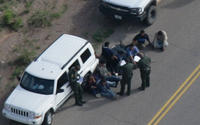-
Brite-Strike's LED-technology gloves saving officers' lives
The Massachusetts company’s new product aims to help save officers’ lives: it is a pair of tactical, fingerless gloves that have a translucent, reflective, plastic octagonal stop sign on the palm, into which Brite-Strike puts a high-power LED that flashes with a range of up to a quarter of a mile; on the back of the glove are reflective translucent green strips, with two LEDs
-
-
Boston police using Twitter to nab bad guys
After a flasher on Boston T Red Line was caught thanks to a passenger’s tweet, the MBTA is showing a genuine commitment to using social media, creating an official Twitter home page to serve as a public tip line; the transit cops are also creating a system which will allow riders to send tips (and photos) via text messages directly to the authorities
-
-
FBI agent says Mexican drug cartels more violent than al Qaeda
An FBI Web page quoted an agent calling Mexico’s drug cartels more violent than al Qaeda; the quote, from an unidentified senior agent based in El Paso, Texas, says, “We think al Qaeda is bad, but they’ve got nothing on the cartels”; the FBI says the quote was taken out of context
-
-
Mexican drug cartel offers $1 million for Sheriff Arpaio's head
Maricopa County Sheriff Joe Arpaio is well-known for creating a tent city jail in the Arizona desert, providing pink underwear for inmates, and bragging that he spends more to feed his dog than a prisoner in his jail; on 29 July, the day parts of Arizona’s immigration law, SB 1070, went into effect, Arpaio was in the news for another reason: there was a price put on his head
-
-
Foreign firms have largely escaped the worst of Mexico violence, so far
Foreign companies have so far escaped the worst of a rising tide of crime in Mexico; if they can be shielded from violence, foreign companies are likely to focus on the virtues of doing business in Mexico, such as low labor costs, proximity to the American consumer, and favorable trade treatment
-
-
License plate readers help police nab criminals
Six Ohio law agencies are set to deploy Automated License Plate Readers; these devices can scan thousands of license plates per day with the purpose of flagging down license plates that have already been entered into a database because of felony warrants, expired plates, stolen vehicles, or various other crimes
-
-
Detroit public schools outsource security
Detroit Public Schools (DPS) fired all of its 226 security officers Friday and hired a private company to provide in-school security; the move will save the district an estimated $5.5 million through a one-year contract
-
-
Better to teach old dogs new tricks
DHS recently announced that it wants to buy 3,000 dogs from breeders — at a cost of $4,535 per dog — to increase its force of canines who sniff out explosives, cash, and drugs; since only 20 percent of dogs who are selected for service programs successfully complete the training process, this plan will actually result in breeding 15,000 dogs, of which 12,000 will end up in shelters; one expert offers an alternative: DHS should follow the lead of the Hearing Ear Dog Program and many police departments and fill its ranks with dogs adopted from shelters
-
-
The world (supposedly) safest locks easily defeated by paper clips, screw drivers
Security experts demonstrate how locks which tout themselves as the safest lock available — fingerprints-based Biolock Model 333; Kwikset, a programmable “smartkey” lock , the innovative iLoq C10S which uses the action of a key being pushed into the lock to generate power for electronics that then checked data in a chip on the key to determine whether the user is cleared for access; AMSEC electronic safe Model es1014; KABA InSync deadbolt — can be easily defeated by using nothing more than wires, magnets, air, shock, paper clips, screw drivers, and other improvised tools
-
-
Secure Communities to have greater impact than Arizona immigration law
Since 27 October 2008 through the end of May 2010, almost 2.6 million people have been screened with Secure Communities; of those, almost 35,000 were identified as illegal immigrants previously arrested or convicted for the most serious crimes, including murder and rape; more than 205,000 who were identified as illegal immigrants had arrest records for less serious crimes; during an eight-month period between 1 October 2009 to 7 June 2010, ICE figures show that 113,453 foreign nations with criminal records had been deported
-
-
End to water-boarding: Using brain waves to reading terrorists minds about imminent attacks
There may soon be no need for water-boarding or other “enhanced interrogation” to extract vital information about pending attacks from captured terrorists or terrorism suspects; Researchers at Northwestern university were able to correlate P300 brain waves to guilty knowledge with 100 percent accuracy in the lab
-
-
UAVs fail to penetrate India's dense forests to track Maoist militants

Indian security forces, battling the militants of the Naxals Maoist group, say that UAVs which perform well in the deserts of Iraq and the barren mountains of Afghanistan and Pakistan, are useless in the densely forested areas of eastern India; Indian security experts say that issues concerning internal security in the country have now reached the board room of Indian business companies and that the new technology these companies produce should be able to meet the specific needs of Indian security forces rather than offer something which is not applicable to Indian conditions
-
-
Arizona's new immigration law in effect tomorrow; degree of federal cooperation unclear

Arizona tough immigration law goes into effect tomorrow; it is not clear to what extent the Immigration and Customs Enforcement (ICE), the U.S. immigration enforcement agency, will cooperate with police who are trying to enforce it; ICE officials said they are waiting to see whether the law survives court challenges, contending that the law is unconstitutional and could lead to racial profiling; there is a history of cooperation between ICE and Arizona law enforcement: the agency has signed so-called 287(g) agreements with nine law-enforcement agencies in Arizona that either allow local officers to enforce federal immigration laws or allow jail officials to identify illegal immigrants booked into jails to be processed for deportation
-
-
Sophisticated crime software helps police predict violent offences
“Minority Report”-style technology being tested by two British forces following success in the United States; the system, known as CRUSH (Criminal Reduction Utilizing Statistical History) evaluates patterns of past and present incidents, then combines the information with a range of data including crime reports, intelligence briefings, offender behavior profiles, and even weather forecasts
-
-
U.K. citizens to be spied on by foreign police
The U.K. Home Office today signed up to the European Investigation Order (EIO) which, when it is approved by the European Parliament, would allow any police force in Europe to spy on and pursue Britons even for the minor offenses; the power allows prosecutors from any EU country to demand details such as DNA or even bank and phone records on anyone they suspect of a crime as minor as leaving a restaurant without paying the bill
-
- All
- Regional
- Water
- Biometrics
- Borders/Immig
- Business
- Cybersecurity
- Detection
- Disasters
- Government
- Infrastructure
- International
- Public health
- Public Safety
- Communication interoperabillity
- Emergency services
- Emergency medical services
- Fire
- First response
- IEDs
- Law Enforcement
- Law Enforcement Technology
- Military technology
- Nonlethal weapons
- Nuclear weapons
- Personal protection equipment
- Police
- Notification /alert systems
- Situational awareness
- Weapons systems
- Sci-Tech
- Sector Reports
- Surveillance
- Transportation
Advertising & Marketing: advertise@newswirepubs.com
Editorial: editor@newswirepubs.com
General: info@newswirepubs.com
2010-2011 © News Wire Publications, LLC News Wire Publications, LLC
220 Old Country Road | Suite 200 | Mineola | New York | 11501
Permissions and Policies
Editorial: editor@newswirepubs.com
General: info@newswirepubs.com
2010-2011 © News Wire Publications, LLC News Wire Publications, LLC
220 Old Country Road | Suite 200 | Mineola | New York | 11501
Permissions and Policies
